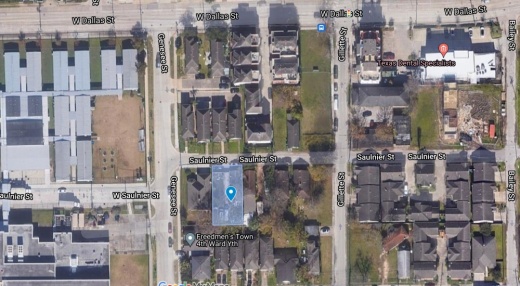The Freedmen's Town Conservancy—a nonprofit that works to preserve and protect Freedmen's Town—launched a GoFundMe campaign to raise $500,000 to purchase a double-lot property at 1609 Saulnier St. in the Fourth Ward, which leaders said is under threat of demolition. The group has been negotiating with the developers who own the property, who agreed to sell for the $500,000 price tag, said Zion Escobar, the conservancy's executive director. However, the money must be raised by Dec. 15, she said.
"We have been negotiating for weeks, months even, and have been exploring all kinds of alternatives," Escobar said. "As a conservancy, our entire intention is to protect and preserve Freedmen's Town for the benefit for future generations."
The developer is listed as Hollywood Investment Corporation by the Harris County Appraisal District.
Freedmen's Town once consisted of 530 historic structures in a 40 block area, a number that has since dwindled to around 50 structures, according to the effort's GoFundMe page. Escobar said she sees properties like the one at Saulnier go up for demolition every month, including one site where she said condominiums are now being built.
"We’re here to stop that bleeding," she said. "This is their private property; you can’t tell them they can't [demolish it]. We just want to incentivize the right thing by creating the framework to do the right thing."
If the campaign is successful, Escobar said the next steps would involve making repairs to the existing structure before donating it to a city of Houston-sponsored entity that will convert it into affordable housing. The initiative could serve as a pilot program for a community land trust, which would work to save properties facing similar fates while also helping to stabilize home prices and fund repairs to other structures. The conservancy began a grant-funded preservation incentive plan earlier this year, she said.
However, Escobar said those longer-term plans could go in a number of directions. Whichever direction is taken would be informed by community feedback, she said. The most important step for now is raising the money to buy the building facing an immediate threat.
"We’re creating the foundation for the tool that really could change the dynamic for a segment of properties," Escobar said. "We can’t change history, but we can take what’s left and save it."
If the campaign is not successful, all donations will be returned. Learn more about the campaign and donate here.





